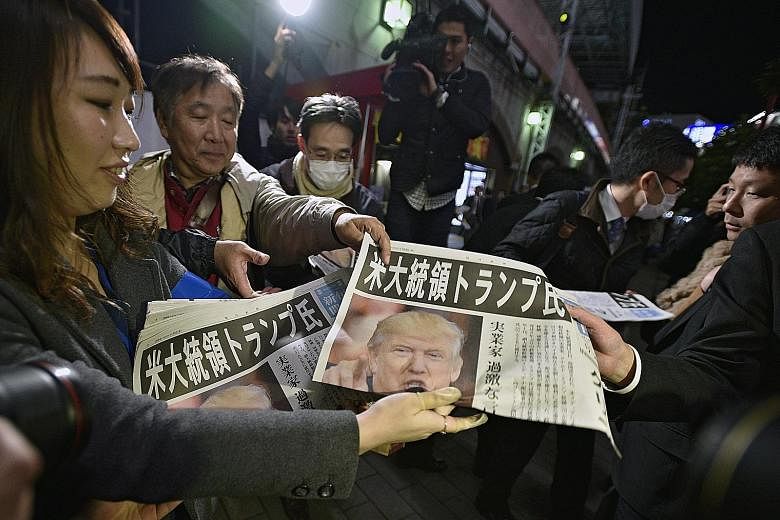TOKYO • US President-elect Donald Trump's meeting this week with Japanese Prime Minister Shinzo Abe may mark the start of talks to garner Japan's support for a pushback against China's growing influence in Asia, a security adviser to Mr Trump said.
The meeting comes as Japan, for a second time in a week, accused Chinese coast guard vessels of sailing into territorial waters around disputed islands in the East China Sea.
The four ships yesterday entered the waters surrounding the island chain, controlled by Japan and known as Senkaku to the Japanese and Diaoyu to the Chinese, at about 10.30am and left within two hours, according to Japanese coast guard.
In the face of a rising China and a volatile North Korea, Mr Trump's campaign comments, including a demand that Japan pay more for the upkeep of US forces on its soil, have worried Tokyo about a rift in a security alliance with Washington that has been the bedrock of its defence since World War II.
A tougher stance against China, however, and a call for Japan to play a bigger security role through a Trump-Abe axis would fit with Mr Abe's hawkish policies that include allowing the military to operate more freely overseas.
Mr Abe will meet Mr Trump in New York on Thursday before heading to the Asia-Pacific Economic Cooperation summit in Peru.
Mr Trump was looking to Japan "to play a more active role in Asia", said the adviser, who declined to be identified. Mr Abe, he added, was "a uniquely placed figure to offer leadership in the alliance".
Senior US Navy commanders have said they would welcome joint air and sea patrols with Japan's military in the disputed South China Sea, where the construction of island bases is extending Beijing's influence.
Mr Trump, in his first 100 days in office, would end budget sequestration that mandates spending, including cuts in military outlays, and submit a budget that would fund construction of dozens of new warships, the adviser said.
It would "send a message to Beijing as well as allies Japan and South Korea and other nations that the US is intent on being in (Asia) for a long time", he added.
However, current US officials warn it would be difficult to build and absorb new warships.
"Ships can't be built overnight," a US defence official said, speaking on the condition of anonymity. "The larger concern is how they would be funded and manned."
The official said that even if the funds were available, it would be necessary to find shipyards and skilled workers to build the ships.
Ending sequestration is also easier said than done, requiring the approval of Congress, where the support would be needed of Democrats staunchly opposed to giving the Pentagon more money without also spending more on social programmes.
The Trump adviser said the President-elect would want to allay any "unfounded" concerns Mr Abe may have and affirm his commitment to their countries' security alliance.
Potential friction between the two countries, however, exists over how much Tokyo pays for the deployment of US forces in Japan. Japan said the funding it provides, which covers three-quarters of the cost, is enough.
"We are bearing the burden for what we should bear," Japanese Minister of Defence Tomomi Inada told reporters in Tokyo last Friday, Kyodo News reported.
REUTERS, AGENCE FRANCE-PRESSE

